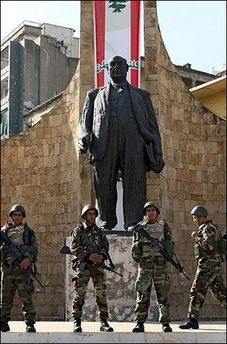 By Robert F Worth, Lebanon may seem an unlikely holiday spot: the government has collapsed, car bombs go off periodically and foreign envoys warn of an impending civil war.And yet, so many people have been streaming into this tiny, embattled country in recent days that the flights are all overbooked, and some well-heeled travelers are driving 18 hours from the Persian Gulf. Beirut’s restaurants, bars and malls are all packed with revelers.
By Robert F Worth, Lebanon may seem an unlikely holiday spot: the government has collapsed, car bombs go off periodically and foreign envoys warn of an impending civil war.And yet, so many people have been streaming into this tiny, embattled country in recent days that the flights are all overbooked, and some well-heeled travelers are driving 18 hours from the Persian Gulf. Beirut’s restaurants, bars and malls are all packed with revelers.
Why? The answer is that the Lebanese diaspora reverses itself on holidays, as the migrants who sustain the war-shattered Lebanese economy all year return from jobs across the globe to spend time with their families. Nothing will deter them
The table was a panorama of the diaspora: one of the men lived in Singapore; one in Aden, Yemen; one in Jidda, Saudi Arabia; and one in Dubai. All had come home to see the families they helped sustain.
But despite such troubles, ordinary Lebanese Christians are celebrating the holiday in style, despite the troubles. Churches have been packed with worshippers. The sounds of Christmas caroling echo across mountain villages. Shoppers swarmed the 200 stores and dozen or so restaurants of East Beirut’s chic ABC Mall. Tickets for movies at multiplexes are sold out. Lebanese Christians working or studying in Europe, North America and the Persian Gulf came streaming back to visit their families.
Mustapha, of the blog Beirut Spring, was incredulous at the volume of traffic he had to contend with while driving from the northern city of Tripoli to Beirut’s Rafik Hariri International Airport.
I calculated that my trip will take the usual one hour and a half. I was wrong. I blame my nearly-missed flight (and the terrible prospect of having to wait a month for another available seat) on all the shopping going around; it took me an additional 30 minutes to cross the Dbayyeh highway facing the ABC Mall, and an additional 30 minutes in the 500 meters strip before City Mall. I’ve driven on this highway for ages, but I’ve never seen so many people. Where did they all come from?
The fact that Christmas almost coincided this year with the Muslim holiday Id al-Adha may have prompted more emigrants to return. In other ways, it is an ominous time: Lebanon has been without a president since Nov. 23, when Émile Lahoud stepped down without any agreement on a successor. Since then, Parliament has delayed voting on a new president 10 times, and negotiations have grown steadily more rancorous.
Hasbini, who works for a television and film equipment company in Jidda, waved it all aside. "We get fed up," he said. "It’s like WWF or a soap opera, except here we get it live.
"Politics? Khalas, you’re home," he added, using the Arabic word for "enough."
For some families, Lebanon has become little more than a reunion site.
"We’re all here for the holidays but none of us live here anymore," said Maria Pamoukian, 28, an urban planner based in Abu Dhabi who was born in Beirut. There are 10 people in the family — seven adults and three children — she added, all now scattered across the globe, though they still maintain a big apartment here.
Like many others, Pamoukian said she struggled to find a plane ticket, and succeeded only after pleading with the airline to give her a break because a friend was getting married. They gave her a ticket to Damascus, and she drove the rest of the way, she said. The trip took 16 hours.
Tarek Masri, 26, said he had almost given up on getting a flight from Saudi Arabia, where he works, until a car bomb east of Beirut killed one of Lebanon’s top army generals last week. That prompted a cancellation, and he got his ticket home.
Beirutis like Masri are too hardened by years of civil war to be intimidated by a bombing.
"It’s usually Gulfi tourists who cancel when that happens," he said. "It’s not the Lebanese. We’ve heard it all before, seen it all before."
But there is a corollary to this ritual of return: much of the middle class — including many of its best and brightest — no longer live in Lebanon. The pace of emigration appears to have picked up after the violence of the 2006 war with Israel and the political crisis that has followed, said Guita Hourani, a sociologist at Notre Dame University in Zouk Mosbeh, north of Beirut, who has studied migration patterns.
The oil wealth in the gulf region has also helped lure away more young Lebanese. "It’s getting harder to find skilled people," said Nassib Ghobril, the head of research and analysis for Byblos Bank. "Gulf companies come here and poach people from banks and other sectors. They recruit whole classes of graduating seniors."
These migrants supply Lebanon with about $1,400 per capita every year, Ghobril said — one of the highest rates of remittances in the world. Those transfers are one of the pillars sustaining the consumer economy, he added, though they do not make up for the country’s soaring public debt, the lack of long-term investment here, or the slow bleeding of the country’s main natural resource — its people.
But there is another way of looking at it.
"Perhaps instead of talking about brain drain we should talk about brain globalization," Ghobril said with a mischievous grin. "The globalization of Lebanon."



